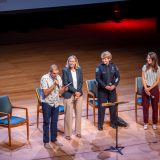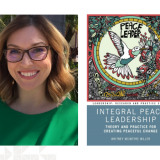
Learning by Giving Attallah Pilot Project Bridges Graduate Research, Undergraduate Career Training, and Charitable Giving
May 20, 2019

Alisa Driscoll ’19, winner of the MLD 2019 Outstanding Student Award for her Chapman PEPP capstone project, and Dr. Whitney McIntyre Miller
Alisa Driscoll (MLD ’19) tends to think about the big picture. The current Communications and Operations Manager in Chapman University’s Office of Community Relations graduated this May with a Master of Arts in Leadership Development (MLD) from the Attallah College of Educational Studies. Having spent her career working in community service organizations, she understands the importance of fostering the next generation of philanthropists. So for her MLD capstone project, Driscoll wanted to create something sustainable, something that would impact her community today and for generations to come.
The culmination of Driscoll’s year-long work is the Chapman Panther Experiential Philanthropy Project (PEPP), a pilot program rolled out on the Chapman campus this spring. According to Driscoll, PEPP’s two-fold goal is to engage college students in the local community, opening up their eyes to social issues and social causes in Orange County and the city of Orange. While promoting volunteerism among Chapman students, PEPP also gives them practical grant writing experience and exposure to the work going on in the nonprofit sector.
Plan
The PEPP program is a “learning by giving” approach. The philosophy behind experiential philanthropy is to give college students the opportunity to study social problems and nonprofit organizations and then make decisions about investing funds in them. The students are entrusted with a fixed sum of money, which they award to one or more nonprofit organizations through a group-based decision-making process. The key is to teach the students to actively seek philanthropic solutions rather than just thrown money at problems.
What’s this look like at Chapman?
In partnership with her MLD faculty advisor Whitney McIntyre Miller, Ph.D., Driscoll developed the Chapman PEPP program from the ground up by researching models implemented at other US institutions. Using initial seed funding of $2,000 from the Office of Community Relations, Driscoll designed the program, wrote a PEPP grant application, and created the curriculum to pilot the PEPP program in the IES (Integrated Educational Studies) 103: Philosophy of Helping spring undergraduate course.
For their assignment, the IES 103 students were required to research community problems and local nonprofit organizations, schedule site visits, and submit grant applications for their respective organizations. As a group, the class then evaluated the grant proposals and selected a nonprofit in which to invest the funds.
Teach
Driscoll says IES 103 was a perfect fit for her pilot, as the course instructor Dawn Hunter, Ph.D., was willing to substitute the PEPP program for one of the courses’ three fieldwork assignments.
By integrating grant writing into an academic course, the PEPP program gives a large group of students practical experience. And because the course makes the students responsible for funding a real nonprofit with real money, there are real consequences.
“The class was really excited to find out that they were not just going to do site visits,” said Driscoll. “There was money at stake, and they were actually going to get to write a grant proposal.”
The IES 103 class as whole was tasked with determining the best use of the PEPP funds. Following presentations from each student group on their respective organizations, together the class weighed the benefits and impact of funding each proposal in a boardroom-style debate, looking at short- and long-term factors.
Give
 After several rounds of voting, the IES 103 students chose to fund a computer learning lab at the Friendly Center, a nonprofit headquartered just a few blocks from the Chapman campus that offers programs and services to low-income families, such as after-school tutoring, a food bank, and job development. The center’s mission is to end the cycle of generational poverty in Orange County.
After several rounds of voting, the IES 103 students chose to fund a computer learning lab at the Friendly Center, a nonprofit headquartered just a few blocks from the Chapman campus that offers programs and services to low-income families, such as after-school tutoring, a food bank, and job development. The center’s mission is to end the cycle of generational poverty in Orange County.
The $2,000 grant will help upgrade the Orange tutoring site’s computer lab and provide 10 years of maintenance costs. The Friendly Center had previously secured a donation for all but $2,000 of the computer lab upgrade. Thus, the PEPP $2,000 allows the Friendly Center to complete the computer lab upgrade in time for the 2019–2020 academic school year.
Cathy Seelig, Executive Director of the Friendly Center, said the process was a wonderful experience.
“The Team Friendly Center students were really dynamic and articulate,” she said. “It is very exciting that we now have the final dollars to make a program come true, as this particular project is long lasting.”

IES 103 class group picture with Alisa Driscoll (MLD ’19, left) and Friendly Center Executive Director Cathy Seelig (centered behind the check)
The fact that the computer lab would impact students and their families right away and over the next decade was a deciding factor for the IES 103 students. In addition to student tutoring and homework, during the day the computers are used for adult ESL (English as a second language) classes and job development training. The IES 103 students liked that the upgraded lab will effectively reach all the arms of the Friendly Center programs, as it will benefit students and families now and in the future.
Spencer Belt, one of the four IES 103 students who wrote the Friendly Center grant, found the entire PEPP process really satisfying.
“This is a 10-year commitment to education for low-income students and their families,” he said. “I want to be an elementary school teacher, so knowing I can make significant change to this place and these people’s lives, that was really important to me.”
Repeat
From the beginning, Driscoll’s goal was to build PEPP into a larger institutional program at Chapman. Ultimately, Driscoll hopes PEPP can be integrated into courses in all of the academic schools and college on campus.
“The project was a good way to get us out into and serve the community,” said Devin Bollinger ’19, another member of the IES 103 Team Friendly Center. “It gave an incentive to look into what this group is doing for the community and see ways people can get involved.”
Driscoll sees the PEPP program as a vehicle to nurture a sense of civic responsibility and encourage Chapman students to become involved with nonprofit organizations in the future, as philanthropists, volunteers, and staff.
“With the quality of Chapman programs, our graduates have the potential to be huge philanthropists in the world,” said Driscoll. “It’s important that we help foster that interest and give them the tools they can use to facilitate that process.”
To learn more about the Friendly Center’s programs and services, visit its webpage.
For more details about the Chapman PEPP program or the Office of Community Relations, contact Alisa Driscoll.
Display Image at Top: From left to right, Friendly Center Executive Director Cathy Seelig, Spencer Belt (IES ’21), Prachi Patel (Biological Sciences ’20), and Devin Bollinger (Political Science ’19). The fourth Team Friendly Center IES 103 student Justo Garcia (Business Administration ’20) is not pictured.

